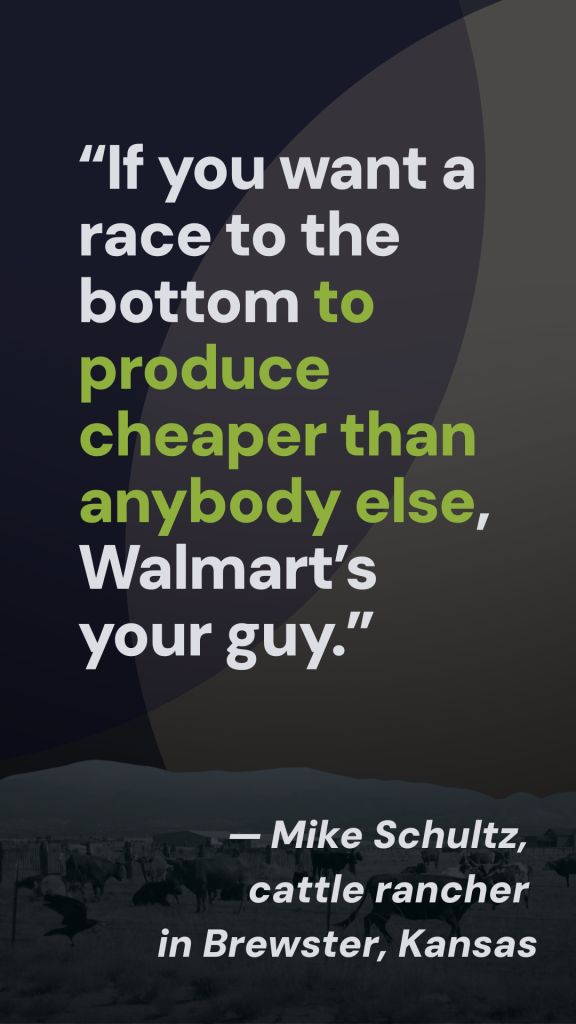Walmart looks to tighten its grip on the beef supply chain

Aerial photos of Walmart’s facility in Olathe, Kansas, on Aug. 2, 2025. photo by David Eulitt for Investigate Midwest Posted in Investigative / Enterprise: Agribusiness
Walmart looks to tighten its grip on the beef supply chain
Ranchers and agricultural advocates warn the nation’s cattle industry is in dire straits as Walmart and Brazilian-based JBS expand in US market.
by John McCracken, Investigate Midwest October 15, 2025
Why you can trust Investigate Midwest
To Mike Schultz, Kansas ranchers are stuck in velvet handcuffs.
Walmart, the nation’s largest grocery retailer and private employer, recently expanded into the U.S. beef industry with its own processing plant in Olathe, Kansas, a suburb of Kansas City. The opening of the Walmart-owned plant in July marked a turning point for the company and the nation’s cattle industry.
Schultz, a cattle rancher in Brewster, Kansas, — a state that accounts for roughly 4% of the nation’s cattle supply — said for now, local ranchers are likely to have better prices with Walmart bidding against other beef giants.
But Walmart is known for cheap prices and Schultz believes the Arkansas-based retailer will soon look to drive down the price it pays for cattle.
“If you want a race to the bottom to produce cheaper than anybody else, Walmart’s your guy,” he said.

This year, the nation’s beef industry is at a crossroads. Ranchers and agricultural experts warn the nation’s already stunted beef industry could be falling under more corporate control.
The domestic herd is at a record low as the U.S. imports more beef than ever before. Brazilian meat giant JBS, the world’s largest beef producer, recently became a publicly traded company with access to U.S. capital, and consumers are spending record prices on beef at the grocery store.
Walmart is now poised to become a significant player in the beef industry, owning cattle from slaughter to sale. This comes at a time when ranchers have fewer buyers for their cattle and declining inventory.
Nine out of 10 states that make up the majority of the nation’s beef supply have seen a decline in the past decade, according to a review of USDA data.
Kansas has seen the largest loss, from 1.4 million in 2016 to 1.2 million in 2025, a 21% decline.
Mike Callicrate, owner of Ranch Direct Foods in Colorado Springs and an advocate for family farms, believes Walmart’s entry into the beef industry at the same time JBS went public on the New York Stock Exchange is the “last domino” to fall for independent ranchers.
Beef is a heavily consolidated industry, with four companies controlling nearly all of the nation’s supply. The federal government attempted to rein in the power of the consolidated meat industry in recent years, but under the Trump administration, guidelines for preventing and investigating antitrust violations in agriculture were scrapped.
“I think our industry is in real trouble until we start enforcing antitrust laws and breaking up concentrated power,” Callicrate said. “You cannot let Walmart control the supply chain.”
The power of Walmart
Walmart’s Kansas beef plant is not the first time the company has dipped its toe into owning parts of the nation’s beef supply chain. It is, however, the first time they’ve had full control.
In 2020, it opened a Thomasville, Georgia, beef processing facility. Owned by a separate food company, the facility’s employees process beef to be case-ready — taking large cuts and slicing them into smaller portions before packaging them for the meat case at their grocery stores.
For full article: https://investigatemidwest.org/2025/10/15/walmart-looks-to-tighten-its-grip-on-the-beef-supply-chain/